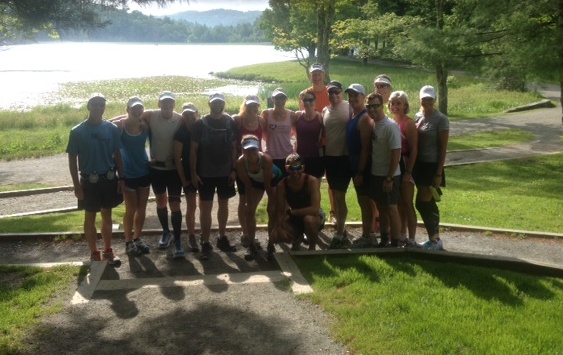|
Getting into and staying in good physical shape is not
the easiest thing in the world. We're constantly tempted by other
things that may be equally enjoyable in the short term. One of those
temptations is skipping your evening workout to sit on the couch, eat
a large pepperoni pizza, and watch a movie. :)
Your nutrition/meal choices are one of the variables
in your training life you can exercise significant control over.
You don't have to be perfect. You just do the best you
can.
Overeating
and poor daily choices can quickly lead to excessive weight gain, and
lead to long term health consequences such as type II diabetes,
hypertension, and obesity. If you battle with overeating or
simply don't understand what make good and bad foods, a session or
two with a licensed nutritionist would be great for you. Purely from
an athletic performance perspective, extra
weight slows you down.
Long term health issues aside, the more serious you
are about your multisport endeavors, the more seriously you need to
stay on top of your daily nutrition. With that, here are a few
tips:
Skip
the soda, except for special occasions. A
regular 12 oz soda has 35 grams or about ten teaspoons of sugar in
it, and this simple sugar in soda (really high
fructose corn syrup) can quickly convert to stored fat.
Exceptions: On the run during a marathon, half-Ironman, or
Ironman - the simple sugar in soda is quickly burned off.
Note: Sugar is not bad. Lots of sugar is bad. :)
Prepare your own meals.
When you make your own food you control a lot of the variables
that go into cooking - like pan frying with extra
virgin olive oil instead of butter, using antioxidant
spices instead of salt to enhance flavor, and using lean meats
(or vegetable alternatives) that limit
saturated fat intake.
Note: Fat is not bad. Lots of fat is bad. :)
Eat breakfast.
I am amazed at the number of people I speak with that don't eat a
real breakfast. I am not saying it is the most important meal of the
day - all your choices count. There is, however, significant
research indicating that eating breakfast leads to stable blood
glucose levels throughout the day (improved insulin sensitivity).
This basically will help you to avoid overeating or bad choices later
in the day.
Have a post workout meal &
rehydrate after longer/harder workouts.
You want this ideally within 30 minutes but not later than 60 minutes
post workout. This is not a license to pig out. You don't need
to refuel after easy or low intensity workouts. There are lots
of articles out there so my summary is: Replace up to / not more
than half the calories burned in the workout with a snack or meal
containing some mix of mostly carbs and some protein. You could
snack at 30 minutes then have a fuller meal at an hour. Liquid
nutrition is easily and quickly absorbed.
Now, you have plenty of choices every day. Let's
line up just a few you can make that will improve your daily
nutrition.
- Drink water or watered down fruit/veggie
drink instead of soda
- Choose steamed veggies or baked
chips/pretzels instead of deep fried french fries
- Choose lean meats, fish, or veggie options
over high fat options (re: veggie sausage vs crispy bacon - I
can hear you howling with displeasure)
- Eat whole grain bread vs white bread (complex
carbs vs simple carbs)
- Cook your own meals using extra virgin olive
oil vs butter, lowfat milk vs whole, paprika and turmeric vs
salt, and so on
- Eat breakfast
- snack on fruits, nuts, vegetables, and
yogurt throughout the day rather than saving it all for a
gigantic 7 course dinner
- Drink coffee. Go ahead and have
more than one cup.
- Stay hydrated
- Go easy on the salt and sugar
- Go easy on the desserts
- When you dine out make the obvious better
choices, at least some of the time
- Chat with a nutritionist if you're having
trouble finding your way.
Marty Gaal, NSCA CSCS,, is a USA Triathlon coach. He
has been working with endurance athletes since 2002 and is the
co-founder of One Step Beyond. His favorite snack is a cup of coffee
with a spoonful of honey.
|






